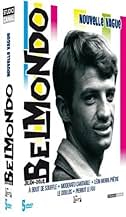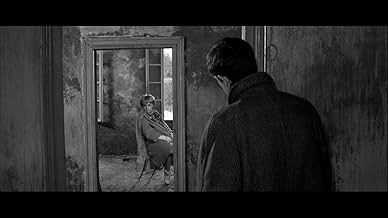Moderato cantabile
- 1960
- 1h 31min
CALIFICACIÓN DE IMDb
6.9/10
1.4 k
TU CALIFICACIÓN
Una mujer adinerada y aburrida es testigo de un crimen pasional y conoce a otro testigo. Le pregunta por la historia de la víctima y se enamora de él.Una mujer adinerada y aburrida es testigo de un crimen pasional y conoce a otro testigo. Le pregunta por la historia de la víctima y se enamora de él.Una mujer adinerada y aburrida es testigo de un crimen pasional y conoce a otro testigo. Le pregunta por la historia de la víctima y se enamora de él.
- Dirección
- Guionistas
- Elenco
- Premios
- 1 premio ganado y 1 nominación en total
Opiniones destacadas
for the Duras's atmosphere. for the lead actors. for the story, landscapes, dialogs, the piano lesson or for its end. for the illustration of a state of soul as result of a mixture of sin, fear, high expectations and fall. a film about a woman and a man. all in simple manner presented. a town. and few meetings. and level of dark revelation. a film of silhouettes and silence. and it is enough for discover an universe who could be part from yourself. a film about choices. and about a strange form of music. Jeanne Moreau is not a surprise. Belmondo is the perfect choice despite the expectations about other actor if you read the novel. the result - not comfortable but good occasion for reflection. about love. and about versions of Madame Bovary.
"Moderato cantabile" (1960) directed by Peter Brook was a movie with a certain spleen of its weather, like a love story in a foggy atmosphere near or not too much far away in Gascogne Gulf from the quite distant channel between England and France. The couple had met in a coffee break at the place of the port and both were seeing each other concerning a criminal environment from the daily journey, nowhere outside with the police searching for somebody helping to solve the killing of someone there.
Director Peter Brook so happy with his career, that he forgot perhaps in making more movies like this one, even though this one it was not so easy in finishing it, but that unfinished touch is not evanescent. This kind of appearance from the main characters, a woman with a child and a man, both young and the message it was there like that. A stylish look for both main characters that knowing something else about an event have an approach to a soft sentimental adventure and forgotten the reality of their acquaintance created a link of friendship without any presumption for after tomorrow.
Because it seems if did you understood that, something is always possible when things are confused for the minds and the first is breathing well and expelled oxygenate air, making steam by night : reconciliation brought her for another stand of high society from the time. It seems also that the screenplay came from someone who had much pleasure to bring any confusion in the mind of the characters with her - because is a she - deconstruction in her obsessive purpose, that life is not so important around if a kiss save your honor and butterfly. This is the strength of Marguerite Duras story adapted anyway by Peter Brook with a kind of innovative and quite prejudice against savagery of the time, during persecutions in France, because colonial defeat at the time mixed with resistance from Gironde tradition where the story came from.
Director Peter Brook so happy with his career, that he forgot perhaps in making more movies like this one, even though this one it was not so easy in finishing it, but that unfinished touch is not evanescent. This kind of appearance from the main characters, a woman with a child and a man, both young and the message it was there like that. A stylish look for both main characters that knowing something else about an event have an approach to a soft sentimental adventure and forgotten the reality of their acquaintance created a link of friendship without any presumption for after tomorrow.
Because it seems if did you understood that, something is always possible when things are confused for the minds and the first is breathing well and expelled oxygenate air, making steam by night : reconciliation brought her for another stand of high society from the time. It seems also that the screenplay came from someone who had much pleasure to bring any confusion in the mind of the characters with her - because is a she - deconstruction in her obsessive purpose, that life is not so important around if a kiss save your honor and butterfly. This is the strength of Marguerite Duras story adapted anyway by Peter Brook with a kind of innovative and quite prejudice against savagery of the time, during persecutions in France, because colonial defeat at the time mixed with resistance from Gironde tradition where the story came from.
Peter Brook acquired the rights to the successful Nouveau Roman 'Moderato Cantabile' from author Marguerite Duras as a vehicle for Jeanne Moreau with whom he had worked on stage in 'Cat on a Hot Tin Roof'.
Brook's previous film 'The Beggar's Opera' had hardly been a resounding success which made it difficult to get funding for this latest venture. However, thanks to the Herculean efforts of producer Raoul Levy the necessary funds came through.
Levy and his backers must surely have been disheartened by the films failure outside of France. Such a pity also that the film became lumbered with the ghastly alternative title of 'Seven Days....Seven Nights', the suggestiveness of which was obviously designed to get bums on seats.
Jeanne Moreau as Anne, the bored and unfulfilled wife of a rich industrialist, is attending a piano lesson at which her young son Pierre is struggling, under the stern eye of his piano teacher, to get to grips with the 'moderato cantabile' movement of a sonatina by Diabelli. They are interrupted by the blood-curdling scream of a woman in the bar next door who has presumably been murdered by her lover. Anne becomes intrigued by and obsessed with the crime and the reasons for it. She meets Chauvin, one of her husband's employees, who seems to offer an explanation and they begin what can only be described as a 'metaphysical' relationship which to Anne's despair, does not progress to the physical.......
This film comes within the Golden Age for stage-trained Jeanne Moreau that began with 'Lift to the Scaffold' for Louis Malle in 1957. Her performance here as Anne is utterly mesmerising and fully justifies her being described by Orson Welles as 'simply the greatest'.
As Chauvin Jean-Paul Belmondo is frankly miscast and by all accounts was bored and mystified by the whole enterprise. His instinctive talent and undeniable screen presence carry him through. Young Didier Haudepin is splendid as Pierre and would excel four years later in 'A Special Friendship', a forgotten masterpiece of Jean Delannoy. Colette Regis certainly makes an impression in her two scenes as Mlle Giraud the piano teacher.
The highlight of the film is the dinner party where Anne finally cracks, the direction of which by Brook is superlative. The final scene between Anne and Chauvin also leaves a deep impression.
Shot in lustrous black and white by Armand Thirard this is a compelling and haunting work the power of which lies in its restraint. Moreau's astonishing portrayal won her a Palme d'Or and the film itself marked the start of a long and fruitful collaboration with Marguerite Duras.
In 2001 she came full circle by playing Duras in 'Cet amour-la'.
Two beautiful ugly ones, or two ugly beautiful ones, a perfect couple on the screen. Neither Belmondo nor Jeanne Moreau were beauties, they had an immense personal charm that made them likeable. Plus a great talent in expressing with terrible ease what thousands of other actors struggle in vain to express. Both, Moreau and Belmondo, did not even need words, they could convey enormously just by their presence, just by a look. Two geniuses of cinematography who delighted my childhood in particular and my adult life, I saw almost all their films, only this "Moderato Cantabile" was missing because, made in 1960, I was too young, I was less than 2 years old at the time and I don't even know if it was in the cinemas in Bucharest. I found it on YouTube now in March 2025 and watched it with great interest, although I was very tired, with many hours of sleep minus. A very delicate film that is worth seeing. However, knowing the extremely low intellectual level of today, it will only be of interest to those who know who Moreau and Belmondo were.
This has to be one of the dullest films of the early Sixties. Remember that Godard, Malle, Truffaut and company had been challenging the traditions of story telling; the world seemed young again, and full of possibilities. Moderato cantabile has nothing of this spirit. It might have been made by an old-guard director like Clément or Delannoy (if they had decided to take a chance on a Duras script).
There isn't much energy or interest in this story: what happens in the first ten minutes is endlessly rehashed throughout the remainder. Belmondo is ill at ease here, or at least seems that way to me--there is no chance for any extroversion, exuberance or even anger from the character. Jeanne Moreau is used decoratively (Brook must have seen what Resnais was able to do with Delphine Seyrig in Last Year In Marienbad) and always looks elegant, if never really desperate or anguished. You know something's wrong when the piano teacher provides much of the dramatic interest: she's bullying the child into giving her a Diabelli sonata "moderately, with a singing feeling".
Note: I have just remembered that Clément did do a Duras script (Barrage contre le Pacifique) in 1958.
There isn't much energy or interest in this story: what happens in the first ten minutes is endlessly rehashed throughout the remainder. Belmondo is ill at ease here, or at least seems that way to me--there is no chance for any extroversion, exuberance or even anger from the character. Jeanne Moreau is used decoratively (Brook must have seen what Resnais was able to do with Delphine Seyrig in Last Year In Marienbad) and always looks elegant, if never really desperate or anguished. You know something's wrong when the piano teacher provides much of the dramatic interest: she's bullying the child into giving her a Diabelli sonata "moderately, with a singing feeling".
Note: I have just remembered that Clément did do a Duras script (Barrage contre le Pacifique) in 1958.
¿Sabías que…?
- TriviaAccording to biographer Olivier Todd, Peter Brook offered writer Albert Camus an acting job in Moderato cantabile. Camus died in a car accident before he could take it.
- ErroresIn original release copies the title card read "Moderato contabile", but they were not retired from circulation.
- Citas
Anne Desbarèdes: Try to remember: Moderato means gently - it's nearly the same - and Cantabile means melodiously. It's easy.
- ConexionesFeatured in Jeanne M. - Côté cour, côté coeur (2008)
Selecciones populares
Inicia sesión para calificar y agrega a la lista de videos para obtener recomendaciones personalizadas
- How long is Seven Days... Seven Nights?Con tecnología de Alexa
Detalles
- Tiempo de ejecución
- 1h 31min(91 min)
- Color
- Relación de aspecto
- 2.35 : 1
Contribuir a esta página
Sugiere una edición o agrega el contenido que falta









